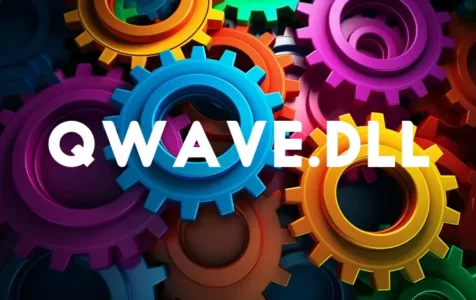Qwave.dll is a dynamic link library (DLL) file closely associated with the Microsoft Windows Operating System. As part of the system, this DLL plays a crucial role in the operation and provision of Quality Windows Audio Video Experience (qWave) services. This service acts as a networking platform for audio and video (AV) streaming applications over IP home networks. It’s especially important for enforcing quality-of-service (QoS) policies to manage network traffic effectively, ensuring smooth streaming and multimedia experiences.
Is Qwave.dll Safe to Run?
Yes, qwave.dll is safe to run as it is a legitimate component of the Windows operating system, provided by Microsoft. The file is commonly found in the C:\Windows\System32 folder and is not meant to be an application that appears visible to users under normal circumstances. However, any DLL files, including qwave.dll, can pose a security risk if they are corrupted by malicious software.
Could Qwave.dll Be a Virus or Malware?
While qwave.dll itself is not a virus, like any other system files, it can be mimicked or disguised as malware. Malicious programs could use the name “qwave.dll” to avoid detection. Therefore, if the file is located outside the System32 folder or showcases unusual behavior, it could potentially be a disguised threat. Using a reputable antivirus program to scan for and remove malware is recommended to ensure that your system is not compromised.
Common Issues Associated with Qwave.dll
The issues that can arise from qwave.dll are usually related to errors such as the file being missing, not found, or corrupted. Sometimes, these errors occur as a result of a faulty application or a damaged Windows registry. Certain PC games or applications may also specifically require the qwave.dll file to be present in their installation folder for the game or application to run correctly.
Expert Tip: For smoother PC performance, consider using a PC optimization tool. It handles junk files, incorrect settings, and harmful apps. Make sure it's right for your system, and always check the EULA and Privacy Policy.
Special offer. About Outbyte, uninstall instructions, EULA, Privacy Policy.
Users may encounter error messages such as:
– “The program can’t start because qwave.dll is missing from your computer.”
– System errors indicating problems running certain servers or programs like Mumble Server, usually due to a version mismatch or missing components.
How to Fix Issues Related to Qwave.dll
If you’re experiencing issues related to qwave.dll, the following methods may help resolve them.
Method 1: Restore or Repair the Missing Qwave.dll File
– You can attempt to download and replace the qwave.dll file but this should be done with caution only from trusted sources and ensuring that you download the correct version for your system (32-bit or 64-bit).
– It’s important to place the newly downloaded qwave.dll file in the correct directory, which is usually the System32 folder or the application’s installation folder if specified.
Method 2: Run the Windows System File Checker (SFC)
– Open the Command Prompt with administrative privileges.
– Enter the command `sfc /scannow` and press Enter.
– The SFC will scan for and attempt to repair any corrupt or missing system files, including qwave.dll.
Method 3: Check for Windows Updates
– Qwave.dll-related errors might be resolved by updating your Windows OS, as some updates could include fixes for system file issues.
Method 4: Perform a System Restore
– If the error started appearing after a recent change to your system, you could revert to a previous state using Windows System Restore.
Method 5: Register the DLL File Manually
– If the qwave.dll is on your system but not properly registered, you can manually register it using the Command Prompt.
– Enter the command `regsvr32 qwave.dll` and press Enter.
Method 6: Install Required Windows Features
– For servers like Windows Server 2008, it may be necessary to install additional features such as Quality Windows Audio Video Experience if it’s not already present.
Conclusion
Qwave.dll is a legitimate and necessary file for Windows, particularly tied to audio and video streaming quality control. It is safe when sourced legitimately as part of your Windows OS. If issues occur related to this file, they can typically be addressed through careful troubleshooting using the methods outlined above. Always maintain regular system backups and use up-to-date antivirus software to avoid and address any security concerns. This ensures not only the health of your system’s files like qwave.dll but also the overall security of your computing environment.
